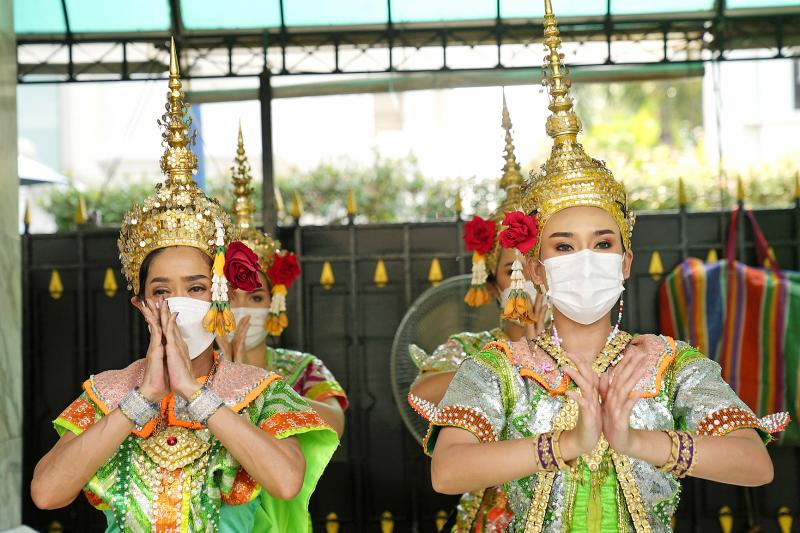Thailand plans to hold travel bubble talks with China and Malaysia this month, days after resuming a quarantine-free visa program to boost tourist arrivals seen as key to sustaining a nascent economic recovery.
Thai Prime Minister Prayuth Chan-ocha’s government is soon to discuss with the Chinese Ministry for Culture and Tourism details of a possible bilateral travel deal, government spokesman Thanakorn Wangboonkongchana said in a statement yesterday.
Thai officials are also preparing to hold talks with neighboring Malaysia later this month for a similar agreement, he said.

Photo: AP
Thailand is chasing bilateral deals to spark a broader recovery in its pandemic-battered tourism industry after the waiver of quarantine for vaccinated visitors and the so-called tourism sandbox experiments in recent months failed to draw a large number of holidaymakers.
The return of Chinese and Malaysian tourists, the largest groups of visitors to the Southeast Asian nation before the pandemic, is seen by the industry as key to a sustainable rebound.
“We think a travel bubble will be more positive for Thailand’s tourism sector than the currently implemented ‘Test & Go’ quarantine-free scheme, as the latter alone is not enough to attract tourists who will have to quarantine on their return,” Tim Leelahaphan, a Bangkok-based economist at Standard Chartered PLC, said in a note. “While the plan is a good starting point, we think a clear and strong recovery path is unlikely anytime soon and is more likely in the second half or late this year.”
Chinese and Malaysian tourists accounted for more than one-third of the 40 million visitors to Thailand in 2019, contributing more than US$20 billion in tourism revenue, official data showed. Chinese tourists have shunned Thailand since the outbreak, with Beijing imposing curbs on outbound travel.
Under the travel bubble, tourists will not be subjected to quarantine, and can enjoy special visa and accommodation arrangements, Thanakorn said.
The countries will also agree on a quota for travelers and identify specific zones for their movements to prevent fresh COVID outbreaks, he said.
“The prime minister believes Thailand remains an attractive tourist destination for foreign travelers even during the pandemic,” Thanakorn said.
“The government has supported the restoration of tourism in a new normal” that seeks a balance between safety of travelers and the public, which may become the model for tourism in the future, he said.

The Eurovision Song Contest has seen a surge in punter interest at the bookmakers, becoming a major betting event, experts said ahead of last night’s giant glamfest in Basel. “Eurovision has quietly become one of the biggest betting events of the year,” said Tomi Huttunen, senior manager of the Online Computer Finland (OCS) betting and casino platform. Betting sites have long been used to gauge which way voters might be leaning ahead of the world’s biggest televised live music event. However, bookmakers highlight a huge increase in engagement in recent years — and this year in particular. “We’ve already passed 2023’s total activity and

Nvidia Corp CEO Jensen Huang (黃仁勳) today announced that his company has selected "Beitou Shilin" in Taipei for its new Taiwan office, called Nvidia Constellation, putting an end to months of speculation. Industry sources have said that the tech giant has been eyeing the Beitou Shilin Science Park as the site of its new overseas headquarters, and speculated that the new headquarters would be built on two plots of land designated as "T17" and "T18," which span 3.89 hectares in the park. "I think it's time for us to reveal one of the largest products we've ever built," Huang said near the

China yesterday announced anti-dumping duties as high as 74.9 percent on imports of polyoxymethylene (POM) copolymers, a type of engineering plastic, from Taiwan, the US, the EU and Japan. The Chinese Ministry of Commerce’s findings conclude a probe launched in May last year, shortly after the US sharply increased tariffs on Chinese electric vehicles, computer chips and other imports. POM copolymers can partially replace metals such as copper and zinc, and have various applications, including in auto parts, electronics and medical equipment, the Chinese ministry has said. In January, it said initial investigations had determined that dumping was taking place, and implemented preliminary

Intel Corp yesterday reinforced its determination to strengthen its partnerships with Taiwan’s ecosystem partners including original-electronic-manufacturing (OEM) companies such as Hon Hai Precision Industry Co (鴻海精密) and chipmaker United Microelectronics Corp (UMC, 聯電). “Tonight marks a new beginning. We renew our new partnership with Taiwan ecosystem,” Intel new chief executive officer Tan Lip-bu (陳立武) said at a dinner with representatives from the company’s local partners, celebrating the 40th anniversary of the US chip giant’s presence in Taiwan. Tan took the reins at Intel six weeks ago aiming to reform the chipmaker and revive its past glory. This is the first time Tan